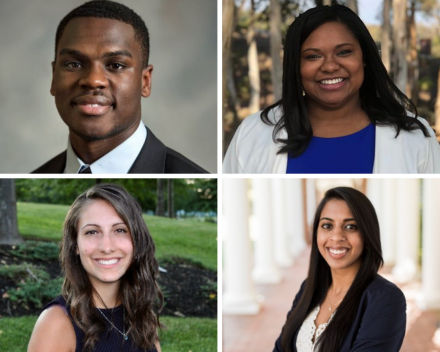Panelists shared and commented on their encounters with biases in the workplace as BIPOC (Black, Indigenous and people of color) professionals.
The Martha and Spencer Love School of Business hosted a panel discussion on Oct. 13 where four Elon alumni spoke on their experiences as BIPOC (Black, Indigenous and people of color) professionals. Panelists discussed biases in the workplace and during the recruitment process, and offered advice on how to develop from or confront these situations.

Brintha Renganathan ’16, Maritza Gamboa ’14, Kennedy Ojimadu ’17 and Durice White Galloway ’09 G’14 served as panelists. Stacy Outlaw, director of undergraduate programs in the Love School of Business, moderated the discussion.
Outlaw stated that bias is a systemic issue within our society and it is critical for everyone, not just those who identify as a person of color, to learn more about how to navigate this systemic problem and be a future business leader and citizen who actively seeks to dismantle it.
Panelists shared experiences and thoughts around being the only female in an industry that is primarily male, the hierarchical nature of corporate America, being a person of color in a predominately white industry, as well as recruiting biases.
The biases that panelists experienced in their careers have contributed to personal struggles with imposter syndrome and intersectionality. Some of the panelists expressed there have been times when they felt they had to act a certain way in the workplace to combat biases, making it more challenging to express their authentic selves as they progress in their career path. Additionally, they discussed how one’s social identity, including race and ethnicity, can be discriminated against in the workplace.
Renganathan strongly encouraged individuals to always be their authentic self and to own their own worth, not letting biases get to them. Individuals can also work to eliminate bias in the workplace by calling out diversity if there is none amongst a group of colleagues, on a team or in a department.
Additionally, Gamboa advised all to interview a company as much as it is interviewing the candidate. Asking questions and doing research can provide one with deeper company knowledge, especially pertaining to the company’s willingness to support diversity, she said.
Outlaw concluded the panel by emphasizing the bar has been raised in corporate America with the Black Lives Matter movement. It is now more important than ever to recognize that a diversity statement does not hold value if there is visibly sparse diversity in the workplace.


